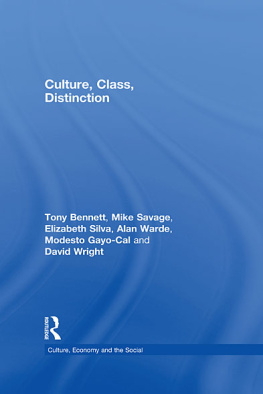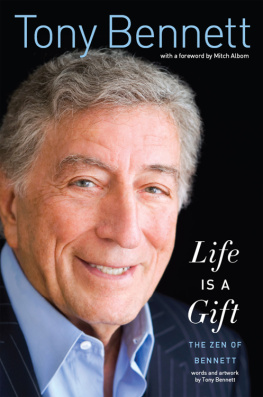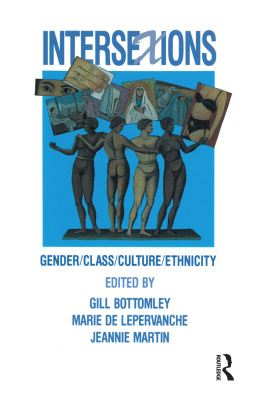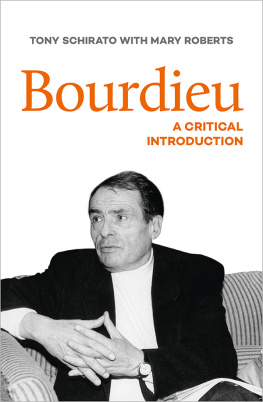Culture, Class, Distinction
The book draws on the research conducted for a major ESRC-funded project on Cultural Capital and Social Exclusion (CCSE) to offer the first systematic assessment of how far Pierre Bourdieus (1984) account of the role played by cultural capital in processes of social differentiation can be applied to Britain.
The book examines the cultural dimensions of class on the basis of a survey administered to a national sample. It also engages with the cultural turn that now accounts for so much of the focus of new work in class analysis and of the importance of gender and ethnicity in relation to class processes.
In doing so, it takes account of the wide-ranging perspectives from which Bourdieus work has been extended and/or critically engaged with, including those of feminist scholarship, American sociological research, debates within cultural studies, the French literature on the sociology of individuals, and work on the relations between ethnicity and cultural capital.
The book is co-authored by Tony Bennett, Mike Savage, Elizabeth Silva, Alan Warde, Modesto Gayo-Cal, David Wright. All are researchers at the ESRC Centre for Research on Socio-Cultural Change (CRESC) a 3.7 million Economic and Social Research Council (ESRC)funded major international Research Centre analysing socio-cultural change.
Tony Bennett is Professor of Sociology at the Open University, a Director of the Economic and Social Science Research Centre on Socio-Cultural Change, and a Professorial Fellow in the Faculty of Arts at the University of Melbourne. Recent publications include Pasts Beyond Memory: Evolution, Museums, Colonialism; New Keywords: A Revised Vocabulary of Culture and Society (edited with Larry Grossberg and Meaghan Morris) and Handbook of Cultural Analysis (edited with John Frow).
Mike Savage is Professor of Sociology at the University of Manchester and Director of the ESRC Centre for Socio-Cultural Change (CRESC). His interests are in social stratification, urban, and historical sociology.
Elizabeth Silva is Senior Lecturer in Sociology at the Open University, a member of the Economic and Social Research Centre on Socio-Cultural Change and of the Centre for Citizenship, Identity and Governance in the Faculty of Social Sciences, Open University. Recent publications include Cultural Analysis: Bourdieus Legacy (edited with Alan Warde, forthcoming), Contemporary Culture and Everyday Life (edited with Tony Bennett) and various journal articles on Bourdieu, cultural capital, gender, visual art and qualitative methods.
Dr. Alan Warde is Professor of Sociology at the University of Manchester. His current research interest include the sociology of consumption, with particular emphasis on food, cultural sociology, social stratification and economic sociology.
Modesto Gayo-Cal was a research fellow at CRESC and the Department of Sociology at the University of Manchester while working on the Cultural Capital and Social Exclusion project. His areas of interest are: theories of nationalism, political behaviour, middle classes, and cultural consumption. He is also interested in the application of statistical methods in the social sciences. He is now a Profesor Investigador at the Universidad Diego Portales in Santiago de Chile.
David Wright was a Research Fellow on the Cultural Capital and Social Exclusion Project, surveying taste in the contemporary UK. He was subsequently appointed to a Research Fellowship in the ESRC Centre for Research on Socio-cultural Change at the Open University to develop his work on the contemporary literary field and cultural policy. He has published extensively in the field of cultural sociology and is currently teaching social science for the Open University in the East Midlands.
Many books are being written about Pierre Bourdieu, turning him into a theoretical classic. But Bennett, Savage and their colleagues have written a book to read alongside Bourdieu, using his work as a model and stimulation for continuing empirical inquiry. With rich new data they tackle the question of how specific Bourdieus famous analysis of Distinction is to France. They show tastes are different in Britain, but that the analytic framework linking tastes to class, cultural capital and habitus is not only transportable but effective and revealing. This is an important book.
Craig Calhoun President of the Social Science Research Council
Culture, Class, Distinction defines the new research frontier in the sociological understanding of the intersection of culture and inequality. Resolutely empirical in orientation, the authors creatively build on and go beyond the seminal work of Pierre Bourdieu to consider simultaneously symbolic boundaries in the context of racial and ethnic diversity, gendered patterns of cultural preferences, specific fields of cultural practices (reading, music, the visual arts, the body), and much more. Social scientists within and beyond the UK have much to learn from this ambitious and path-breaking collective research.
Michle Lamont Professor of European Studies and Professor of Sociology African and African-American Studies at Harvard University
A superb achievement: at once a cogent theoretical reappraisal of Bourdieus masterwork of 20th century sociology, and a uniquely wide-ranging study, offering powerful insights, into the changing contours of culture in British society today. Like Distinction, this book will remain a centrepiece of international sociology.
Georgina Born Professor of Sociology, Anthropology and Music, University of Cambridge
Culture, Class, Distinction is the most sophisticated mapping of British cultural practices and preferences ever undertaken. Using cutting-edge techniques of statistical analysis and engaging critically with the sociology of culture developed by Pierre Bourdieu, it explores the cultural dimensions of class, gender and ethnicity across a range of fields. This is a major contribution to understanding the roots of social inclusion and exclusion in British life, and a complex and subtle piece of social theory.
John Frow Professor of English at School of Culture & Communication, University of Melbourne
The amount of labour that has gone into this work is nothing short of impressive. One can only be grateful for the information produced by the authors concerning the relation between social location and cultural practice in Britain today. But the book does a lot more than this. It offers a highly nuanced analysis of this information. It is an excellent example of how one can innovate theoretically while doing empirical research.
Ghassan Hage Professor of Anthropology and Social Theory, University of Melbourne
Culture, economy and the social
A new series from CRESC the ESRC Centre for Research on Socio-Cultural Change
Editors
Professor Tony Bennett, Sociology, Open University
Professor Penny Harvey, Anthropology, Manchester University
Professor Kevin Hetherington, Geography, Open University
Editorial Advisory Board
Andrew Barry, University of Oxford
Michel Callon, cole des Mines de Paris
Dipesh Chakrabarty, The University of Chicago
Mike Crang, University of Durham
Tim Dant, Lancaster University
Jean-Louis Fabiani, cole de Hautes Etudes en Sciences Sociales
Antoine Hennion, Paris Institute of Technology
Eric Hirsch, Brunel University
John Law, Lancaster University
Randy Martin, New York University
Timothy Mitchell, New York University








